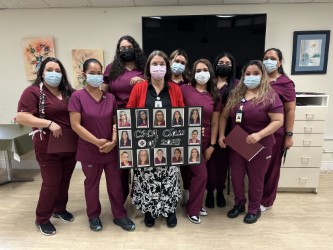The Link between COVID-19 and Obesity
- Category: Health & Wellness, Weightloss, COVID-19
- Posted On:
- Written By: Christopher Taglia, MD, FACS, DABOM

The COVID-19 global pandemic has been taxing on all of us. By the time of writing this, approximately 10 million Americans have been infected by the SARS-CoV-2 virus, and 238,000 have lost their lives. And to make matters worse, beyond the immediate health impact of this virus, one cannot ignore the socioeconomic consequences. 7.5 million small businesses have become at-risk for closing, and 22 million Americans have lost their jobs.
We are currently almost 11 months since the first COVID-19 case was diagnosed in the US. Unfortunately, we remain without a vaccine. And while people the world over continue to practice “social distancing” and wear face-coverings (measures scientifically proven to curb the spread of this disease), we continue to see an “uptick” in cases in various geographic hot-spots, and the death toll continues to rise.
Most of these deaths have occurred in patients considered to be “high-risk.” As the pandemic has raged on, various key risk factors have been identified. This list includes diabetes, hypertension, and chronic kidney disease, to name a few. One of the biggest risk factors, however, is worthy of specific mention. And that is OBESITY.
Health experts have known for a while now that the immune systems of obese individuals are depressed. There is significant metabolic dysfunction associated with obesity, and various chemical markers have pointed to a chronic state of inflammation as the main culprit. Not only this, but we know that obesity is strongly related to the development of diabetes, hypertension, high cholesterol, kidney, and liver disease¾ all known pathways to developing severe illness from this virus.
One study published in June found that severely obese patients (body mass index >35) with COVID-19 were over five times more likely to require a stay in the intensive care unit.[1] Obese patients (defined as body mass index >30) were 7 times more likely to require invasive mechanical ventilation. For patients with severe obesity, this increased to 10 times more likely! Another study, published by the Kaiser Permanente group in August, showed that patients with severe obesity were nearly 3 times as likely to die from the virus.[2]
So, armed with this knowledge, what can we do? How do people who are obese protect themselves? And how can healthcare providers help?
First, it starts with making the extra effort to maintain a healthy diet and to exercise. The pandemic creates numerous obstacles to both of these. With many families feeling the financial impact of COVID-19, there has been a shift towards cheaper “fast-food” options, processed “junk food,” and increased consumption of sweetened beverages. Also, with many working from home (or unemployed), the average activity level has significantly decreased. This has been exacerbated by the closure of many fitness centers and public recreational activities.
It is important that despite this, we continue to try our best to make healthy food choices, to be conscious of what we are putting into our bodies, and to try to exercise at least 30 minutes per day. Doing “home workouts,” riding your bike, or simply walking outside are all excellent options that remain in-play.
Healthcare providers, specifically those that practice primary care, play an important role as well. More than ever, it is important that these providers address their patients’ weight-related to their overall health. Patients considered to be overweight or obese may potentially benefit from referral to a dietician for consultation. Comprehensive strategies can be developed at that time for healthy eating and increased activity. Obese patients with a body mass index over 35 may benefit from referral to a bariatric or weight-loss surgeon. Weight loss surgery (gastric bypass or sleeve gastrectomy) remains by far the most effective and long-lasting treatment for obesity in this population. Lastly, patients who are not surgical candidates may also benefit from medical weight loss therapies. These options should be discussed.
In summary, I hope this pandemic nears its conclusion as the scientific community presses on in its quest to find a safe and effective vaccine. But until it does, we must continue to protect one another by preventing the spread of the virus, and also importantly, minimizing our individual risks by paying attention to our own health, and specifically our weight.
Citations:
- Kalligeros, Markos, et al. “Association of Obesity with Disease Severity Among Patients with Coronavirus Disease 2019. Obesity, 28, no. 7, 2020, pp. 1200-1204., DOI:10.1002/oby.22859.
- “Summary for Patients: Obesity and Risk for Adverse Outcomes Among Patients Diagnosed with COVID-19.” Annals of Internal Medicine, 2020, DOI:10.7326/p20-0011.






